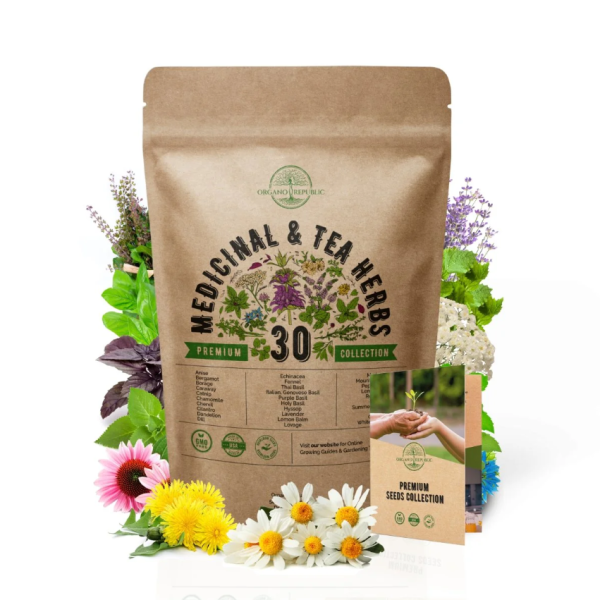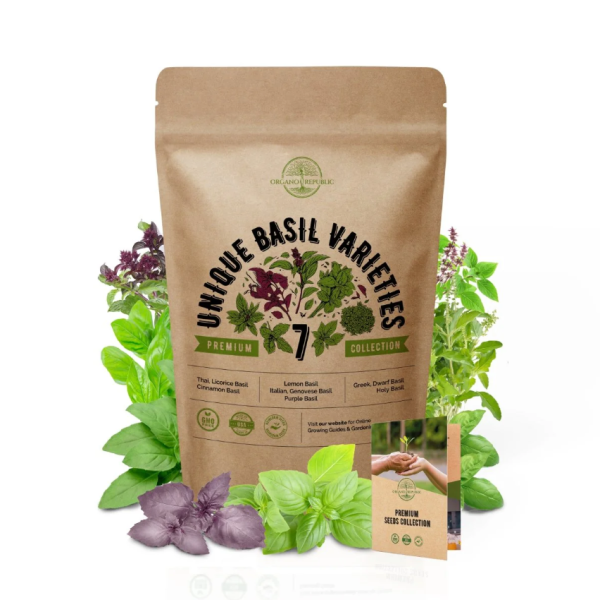Selecting the right herb seeds is crucial for a flourishing garden. With a vast array of herb varieties available, making informed choices can help ensure that your garden meets your culinary, medicinal, and aesthetic needs.
This guide provides essential tips on how to choose the best herb seeds for your garden. If you don’t know where to buy seeds, visit Organo Republic.

Understanding Your Needs and Goals
Consider the types of dishes you frequently cook. Herbs such as basil, parsley, cilantro, and thyme are staples in many kitchens. Make a list of your favorite culinary herbs to prioritize which seeds to purchase.
Medicinal Uses
If you’re interested in medicinal herbs, research which plants provide the benefits you’re looking for. For example, chamomile is known for its calming properties, while echinacea can boost the immune system.
Aesthetic and Aromatic Qualities
Some herbs can enhance the visual appeal and fragrance of your garden. Lavender, for instance, is both beautiful and aromatic, making it a popular choice for ornamental gardens.
Climate and Growing Conditions
Determine your USDA hardiness zone to understand which herbs will thrive in your climate. Some herbs are more temperature-sensitive than others, so choose varieties that are suited to your region.
Sunlight Requirements
Assess the amount of sunlight your garden receives daily. Most herbs prefer full sun (6-8 hours of direct sunlight), though some, like mint and parsley, can tolerate partial shade.
Soil Type
Evaluate your soil’s texture and fertility. While most herbs prefer well-draining soil, some may have specific requirements. Amend your soil with compost or organic matter to improve its quality if needed.
Annuals vs. Perennials
- Annuals. Complete their life cycle in one growing season (e.g., basil, cilantro).
- Perennials. Live for multiple years, offering a continuous harvest (e.g., rosemary, thyme).
Heirloom vs. Hybrid Seeds
- Heirloom Seeds. These seeds come from plants that have been passed down through generations without genetic modification. They often offer unique flavors and characteristics.
- Hybrid Seeds. These are selectively bred for specific traits such as disease resistance or uniformity. Hybrids can be beneficial but may not produce true-to-type seeds if you plan to save them.
Organic vs. Non-Organic Seeds
- Organic Seeds. Produced without synthetic chemicals, organic seeds are ideal for those committed to organic gardening practices.
- Non-Organic Seeds. While still viable, these seeds may have been treated with chemicals. Understand your preferences and gardening philosophy when choosing between the two.
Reputable Seed Suppliers
Purchase seeds from reputable suppliers with a commitment to quality. Look for companies that specialize in herbs and have positive reviews from other gardeners.
Certified Organic Options
If you prefer organic seeds, ensure the supplier offers certified organic options. Certification from organizations like the USDA guarantees that the seeds meet strict organic standards.
Reading Seed Packets
Check the germination rate on the seed packet. A higher germination rate indicates a greater likelihood that the seeds will sprout successfully.
Planting Instructions
Review planting instructions for depth, spacing, and timing. Following these guidelines will help ensure optimal growth conditions for your herbs.
Maturity Time
Consider the time it takes for the herbs to mature. Some herbs, like basil, grow quickly, while others, such as rosemary, may take longer to establish.
Companion Planting
Plan your garden layout by considering companion planting principles. Some herbs, like basil and tomatoes, benefit each other when grown together, while others may compete for resources.
Seed Viability
Check the seed packet for the expiration date. Seeds lose viability over time, so it’s best to use fresh seeds for planting.
Popular Herbs and Their Growing Requirements
There are different requirements for growing herbs.
Basil
- Type: Annual
- Sunlight: Full sun
- Soil: Well-drained, fertile soil
- Water: Regular watering, keep the soil consistently moist
Parsley
- Type: Biennial (commonly grown as an annual)
- Sunlight: Full sun to partial shade
- Soil: Moist, well-drained soil
- Water: Regular watering, do not let soil dry out
Cilantro
- Type: Annual
- Sunlight: Full sun to partial shade
- Soil: Well-drained, slightly acidic soil
- Water: Regular watering, prefers cool weather
Rosemary
- Type: Perennial
- Sunlight: Full sun
- Soil: Well-drained, sandy soil
- Water: Moderate watering, drought-tolerant once established
Thyme
- Type: Perennial
- Sunlight: Full sun
- Soil: Well-drained soil
- Water: Light watering, prefers dry conditions
Conclusion
Choosing the best herb seeds for your garden involves understanding your needs, assessing your growing conditions, and selecting high-quality seeds from reputable suppliers. By considering factors like climate, soil type, and intended use, you can create a thriving herb garden that provides fresh, flavorful, and beneficial herbs throughout the growing season.




